-Transparency International Corruption Perceptions Index 2005 透明国际清廉指数排排位与来源
- 格式:doc
- 大小:50.00 KB
- 文档页数:7
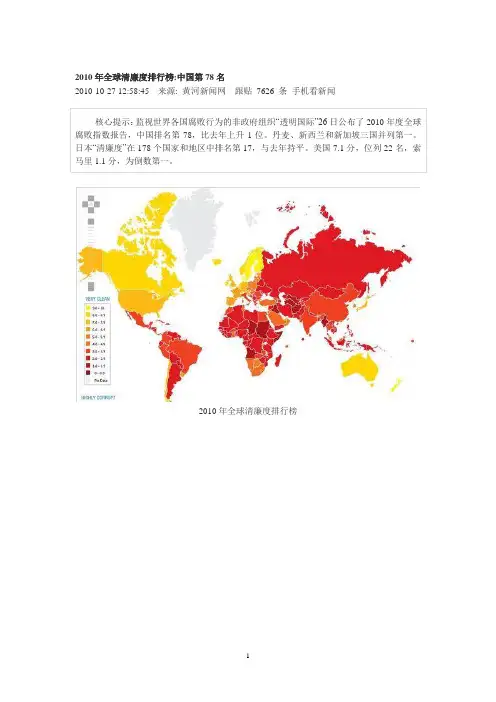
2010年全球清廉度排行榜:中国第78名2010-10-27 12:58:45来源: 黄河新闻网跟贴7626 条手机看新闻核心提示:监视世界各国腐败行为的非政府组织“透明国际”26日公布了2010年度全球腐败指数报告,中国排名第78,比去年上升1位。
丹麦、新西兰和新加坡三国并列第一。
日本“清廉度”在178个国家和地区中排名第17,与去年持平。
美国7.1分,位列22名,索马里1.1分,为倒数第一。
2010年全球清廉度排行榜2010年全球清廉度排行榜注:2010年度腐败指数(corruption perception index 2010):黄色为非常清廉,红色为非常腐败,颜色渐深代表腐败程度的提高,白色为没有数据。
黄河新闻网10月27日报道监视世界各国腐败行为的非政府组织(NGO)“透明国际”26日公布了2010年度全球腐败指数报告。
日本“清廉度”在178个国家和地区中排名第17,与去年持平,中国则排名第78,比去年上升1位。
丹麦、新西兰和新加坡三国并列第一。
腐败指数以各国际组织收集的数据为依据,对各国政治家及公务员的“清廉度”进行评分,满分为10分。
自1995年起每年发布一次。
丹麦、新西兰和新加坡取得9.3分,芬兰和瑞典取得9.2分并列第四。
日本7.8分,中国3.5分。
美国7.1分、位列22名,索马里1.1分、为倒数第一。
阿富汗和缅甸1.4分、居第176。
透明国际强调称:“全世界很多贫穷的人是腐败问题的受害者。
”并呼吁国际社会应加强法制建设,铲除腐败现象。
透明国际(Transparency International)即“国际透明组织”,简称TI,是一个非政府、非盈利、国际性的民间组织。
“透明国际”于1993年由德国人彼得·艾根创办,总部设在德国柏林,以推动全球反腐败运动为己任,今天已成为对腐败问题研究得最权威、最全面和最准确的国际性非政府组织,目前已在90多个国家成立了分会。
它的研究结果经常被其他权威国际机构反复引用。
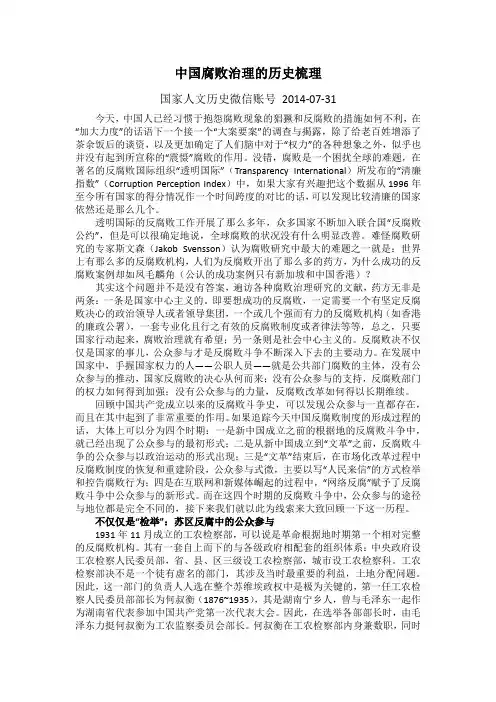
中国腐败治理的历史梳理国家人文历史微信账号2014-07-31今天,中国人已经习惯于抱怨腐败现象的猖獗和反腐败的措施如何不利,在“加大力度”的话语下一个接一个“大案要案”的调查与揭露,除了给老百姓增添了茶余饭后的谈资,以及更加确定了人们脑中对于“权力”的各种想象之外,似乎也并没有起到所宣称的“震慑”腐败的作用。
没错,腐败是一个困扰全球的难题,在著名的反腐败国际组织“透明国际”(Transparency International)所发布的“清廉指数”(Corruption Perception Index)中,如果大家有兴趣把这个数据从1996年至今所有国家的得分情况作一个时间跨度的对比的话,可以发现比较清廉的国家依然还是那么几个。
透明国际的反腐败工作开展了那么多年,众多国家不断加入联合国“反腐败公约”,但是可以很确定地说,全球腐败的状况没有什么明显改善。
难怪腐败研究的专家斯文森(Jakob Svensson)认为腐败研究中最大的难题之一就是:世界上有那么多的反腐败机构,人们为反腐败开出了那么多的药方,为什么成功的反腐败案例却如凤毛麟角(公认的成功案例只有新加坡和中国香港)?其实这个问题并不是没有答案,遍访各种腐败治理研究的文献,药方无非是两条:一条是国家中心主义的。
即要想成功的反腐败,一定需要一个有坚定反腐败决心的政治领导人或者领导集团,一个或几个强而有力的反腐败机构(如香港的廉政公署),一套专业化且行之有效的反腐败制度或者律法等等,总之,只要国家行动起来,腐败治理就有希望;另一条则是社会中心主义的。
反腐败决不仅仅是国家的事儿,公众参与才是反腐败斗争不断深入下去的主要动力。
在发展中国家中,手握国家权力的人——公职人员——就是公共部门腐败的主体,没有公众参与的推动,国家反腐败的决心从何而来;没有公众参与的支持,反腐败部门的权力如何得到加强;没有公众参与的力量,反腐败改革如何得以长期维续。
回顾中国共产党成立以来的反腐败斗争史,可以发现公众参与一直都存在,而且在其中起到了非常重要的作用。
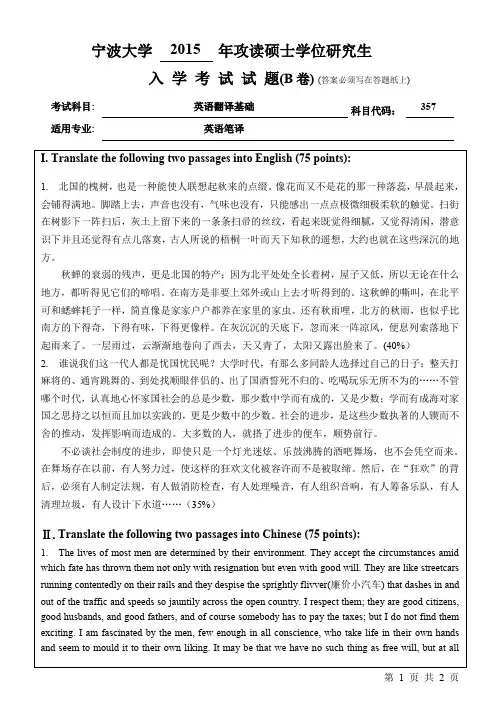
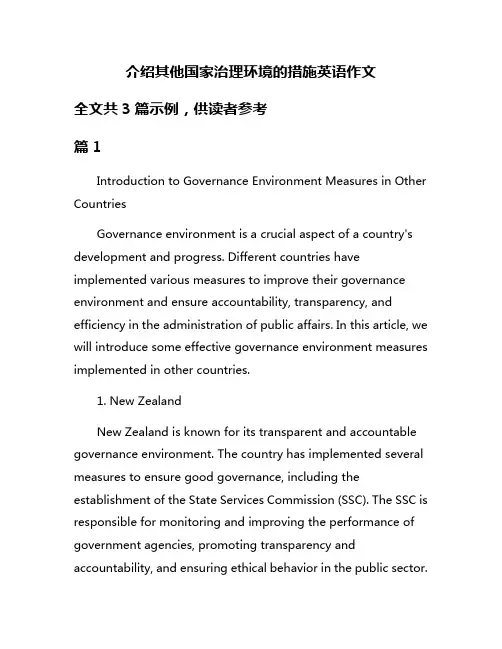
介绍其他国家治理环境的措施英语作文全文共3篇示例,供读者参考篇1Introduction to Governance Environment Measures in Other CountriesGovernance environment is a crucial aspect of a country's development and progress. Different countries have implemented various measures to improve their governance environment and ensure accountability, transparency, and efficiency in the administration of public affairs. In this article, we will introduce some effective governance environment measures implemented in other countries.1. New ZealandNew Zealand is known for its transparent and accountable governance environment. The country has implemented several measures to ensure good governance, including the establishment of the State Services Commission (SSC). The SSC is responsible for monitoring and improving the performance of government agencies, promoting transparency and accountability, and ensuring ethical behavior in the public sector.In addition, New Zealand has a Freedom of Information Act that guarantees citizens' right to access government information. This act enhances transparency and allows the public to hold government officials accountable for their actions.2. SingaporeSingapore is another country that has implemented effective governance environment measures. The city-state has a reputation for its efficient and corruption-free government. One of the key measures implemented by Singapore is the strict enforcement of anti-corruption laws. The Corrupt Practices Investigation Bureau (CPIB) is responsible for investigating and prosecuting corruption cases in the public and private sectors.Singapore also has a strong emphasis on meritocracy in its civil service. The government hires and promotes employees based on their qualifications and performance, rather than nepotism or favoritism. This ensures that the best and brightest individuals are leading the country's public institutions.3. NorwayNorway is known for its high level of trust in government institutions and low levels of corruption. One of the key governance environment measures implemented in Norway isthe establishment of the Office of the Auditor General. The Auditor General is an independent body responsible for auditing government agencies and ensuring they are operating efficiently and effectively.Norway also has a strong emphasis on citizen participation in government decision-making. The country regularly holds referendums on important issues, allowing citizens to have a direct say in the governance process. This enhances transparency and accountability in the government.4. South KoreaSouth Korea has made significant strides in improving its governance environment in recent years. The country has implemented measures to increase transparency and accountability in the public sector, such as the establishment of the Anti-Corruption and Civil Rights Commission. This commission is responsible for investigating corruption cases and promoting ethical behavior in government agencies.South Korea also has a strong focus on e-governance, using technology to improve the delivery of public services and increase citizen engagement. The country has developed online platforms for citizens to access government information,participate in public consultations, and provide feedback on government policies.In conclusion, governance environment measures play a crucial role in shaping the development of a country. The examples mentioned above demonstrate how different countries have implemented effective measures to improve transparency, accountability, and efficiency in their governance environments. By learning from these best practices, countries can strengthen their governance systems and enhance trust in government institutions.篇2IntroductionIn recent years, the issue of governance environment has become increasingly important on the global stage. Governments around the world are taking various measures to improve their governance environment, in order to promote sustainable development, ensure social stability, and enhance the well-being of their people. In this article, we will introduce some of the measures that have been implemented by other countries to improve their governance environment.Transparency and AccountabilityOne of the key aspects of governance environment is transparency and accountability. Many countries have introduced measures to increase transparency in their governance processes, such as implementing open data policies, disclosing government finances and procurement information, and providing access to government decision-making processes. For example, countries like Sweden and Norway have established strong anti-corruption measures and have consistently ranked high on Transparency International's Corruption Perceptions Index.Citizen ParticipationAnother important aspect of governance environment is citizen participation. Many countries have adopted measures to enhance citizen participation in decision-making processes, such as establishing participatory budgeting mechanisms, creating citizen feedback mechanisms, and organizing public consultations on policy issues. For example, countries like Brazil and South Korea have implemented successful participatory budgeting programs, which have empowered citizens to make decisions on how public funds are allocated.Rule of LawThe rule of law is essential for a good governance environment. Many countries have taken measures to strengthen the rule of law, such as reforming their legal systems, establishing independent judiciary systems, and implementing anti-corruption measures. For example, countries like Singapore and New Zealand have established efficient legal systems and have consistently ranked high on the Rule of Law Index.Digital GovernanceWith the advancement of technology, many countries are adopting digital governance measures to improve their governance environment. This includes implementinge-government services, digital identity systems, and using big data analytics for policy-making. For example, countries like Estonia and South Korea have implemented successfule-government platforms, which have improved government efficiency, reduced corruption, and enhanced citizen engagement.Social InclusionPromoting social inclusion is also crucial for a good governance environment. Many countries are implementing measures to address social inequalities, such as providing access to basic services, promoting gender equality, and supportingmarginalized groups. For example, countries like Rwanda and Uruguay have implemented successful social inclusion programs, which have reduced poverty rates, improved access to education and healthcare, and enhanced social cohesion.ConclusionIn conclusion, improving the governance environment is essential for the sustainable development of countries around the world. By implementing measures to increase transparency and accountability, enhance citizen participation, strengthen the rule of law, adopt digital governance, and promote social inclusion, countries can create a conducive environment for effective governance, which will benefit their people and ensure long-term prosperity.篇3Introduction to Governance Environment Measures in Other CountriesGovernance environment plays a crucial role in shaping the economic, social, and political development of a country. Different countries have adopted various measures to improve their governance environment and ensure effective governance.In this article, we will introduce some of the governance environment measures implemented in other countries.First and foremost, transparency and accountability are key principles in governance environment measures. Countries like Sweden, Denmark, and Norway have consistently been ranked at the top of global transparency and accountability indices. These countries have robust systems in place to ensure that government actions are transparent and that public officials are held accountable for their decisions. For example, Sweden has a Freedom of Press Act that guarantees access to public information and promotes transparency in government operations.In addition to transparency and accountability, the rule of law is another important aspect of governance environment measures. Countries like Germany, Japan, and the United States have strong legal frameworks that ensure the rule of law is upheld. These countries have independent judiciaries that provide checks and balances on government powers and protect the rights of citizens. For example, the United States has a system of constitutional checks and balances that prevent any one branch of government from becoming too powerful.Furthermore, citizen participation is a key component of governance environment measures in countries like Australia, Canada, and New Zealand. These countries have implemented mechanisms to engage citizens in the decision-making process and give them a voice in the governance of their country. For example, Australia has a system of compulsory voting that ensures high levels of citizen participation in elections.Lastly, anti-corruption measures are essential for a strong governance environment. Countries like Singapore, Hong Kong, and Switzerland are known for their low levels of corruption and have implemented stringent anti-corruption measures. These countries have specialized agencies that investigate and prosecute corruption cases, as well as strong legal frameworks that prevent corruption in the public and private sectors.In conclusion, governance environment measures are critical for ensuring effective governance and promoting the development of a country. Transparency, accountability, the rule of law, citizen participation, and anti-corruption measures are key components of a strong governance environment. By learning from the experiences of other countries and implementing best practices, countries can improve their governance environment and achieve sustainable development.。
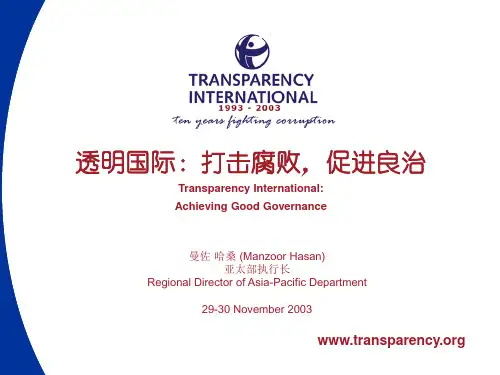
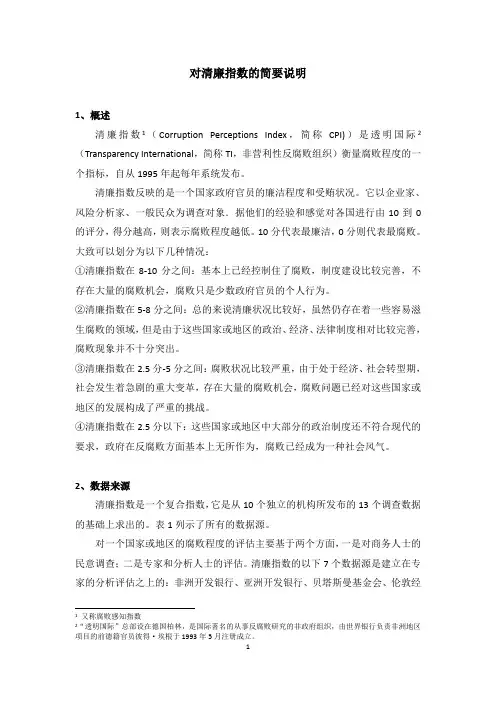
对清廉指数的简要说明1、概述清廉指数1(Corruption Perceptions Index,简称CPI))是透明国际2(Transparency International,简称TI,非营利性反腐败组织)衡量腐败程度的一个指标,自从1995年起每年系统发布。
清廉指数反映的是一个国家政府官员的廉洁程度和受贿状况。
它以企业家、风险分析家、一般民众为调查对象.据他们的经验和感觉对各国进行由10到0的评分,得分越高,则表示腐败程度越低。
10分代表最廉洁,0分则代表最腐败。
大致可以划分为以下几种情况:①清廉指数在8-10分之间:基本上已经控制住了腐败,制度建设比较完善,不存在大量的腐败机会,腐败只是少数政府官员的个人行为。
②清廉指数在5-8分之间:总的来说清廉状况比较好,虽然仍存在着一些容易滋生腐败的领域,但是由于这些国家或地区的政治、经济、法律制度相对比较完善,腐败现象并不十分突出。
③清廉指数在2.5分-5分之间:腐败状况比较严重,由于处于经济、社会转型期,社会发生着急剧的重大变革,存在大量的腐败机会,腐败问题已经对这些国家或地区的发展构成了严重的挑战。
④清廉指数在2.5分以下:这些国家或地区中大部分的政治制度还不符合现代的要求,政府在反腐败方面基本上无所作为,腐败已经成为一种社会风气。
2、数据来源清廉指数是一个复合指数,它是从10个独立的机构所发布的13个调查数据的基础上求出的。
表1列示了所有的数据源。
对一个国家或地区的腐败程度的评估主要基于两个方面,一是对商务人士的民意调查;二是专家和分析人士的评估。
清廉指数的以下7个数据源是建立在专家的分析评估之上的:非洲开发银行、亚洲开发银行、贝塔斯曼基金会、伦敦经1又称腐败感知指数2“透明国际”总部设在德国柏林,是国际著名的从事反腐败研究的非政府组织,由世界银行负责非洲地区项目的前德籍官员彼得·埃根于1993年5月注册成立。
济学人智库、美国的自由之家、环球透视和世界银行;清廉指数的另外3个数据源则是基于所在国的商务人士的民意调查,如管理发展学院(IMD)、香港政治和经济风险分析顾问公司及世界经济论坛等表1 清廉指数的数据来源对基于民意调查的这部分数据源,当几年的数据都是可用的时候,取最近两年的数据。
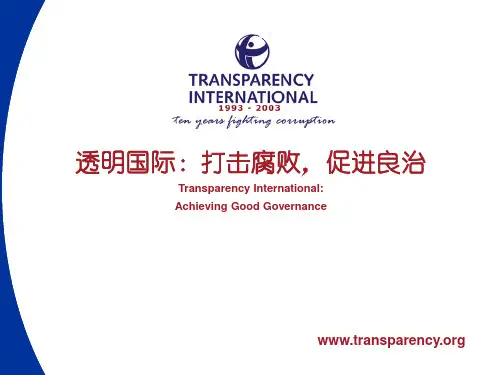
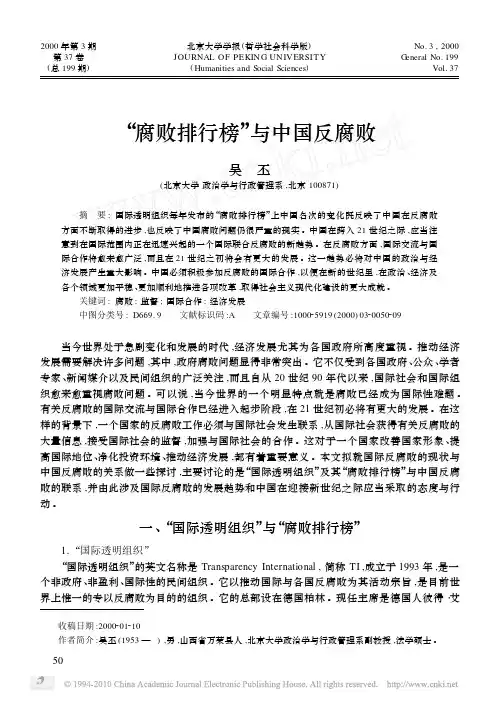
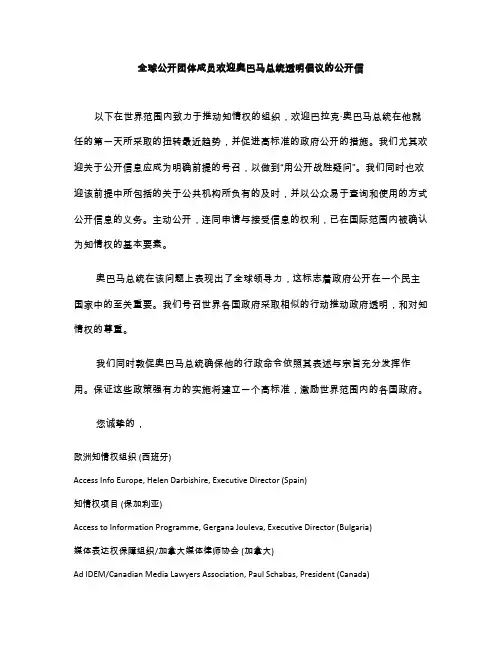
全球公开团体成员欢迎奥巴马总统透明倡议的公开信以下在世界范围内致力于推动知情权的组织,欢迎巴拉克·奥巴马总统在他就任的第一天所采取的扭转最近趋势,并促进高标准的政府公开的措施。
我们尤其欢迎关于公开信息应成为明确前提的号召,以做到“用公开战胜疑问”。
我们同时也欢迎该前提中所包括的关于公共机构所负有的及时,并以公众易于查询和使用的方式公开信息的义务。
主动公开,连同申请与接受信息的权利,已在国际范围内被确认为知情权的基本要素。
奥巴马总统在该问题上表现出了全球领导力,这标志着政府公开在一个民主国家中的至关重要。
我们号召世界各国政府采取相似的行动推动政府透明,和对知情权的尊重。
我们同时敦促奥巴马总统确保他的行政命令依照其表述与宗旨充分发挥作用。
保证这些政策强有力的实施将建立一个高标准,激励世界范围内的各国政府。
您诚挚的,欧洲知情权组织 (西班牙)Access Info Europe, Helen Darbishire, Executive Director (Spain)知情权项目 (保加利亚)Access to Information Programme, Gergana Jouleva, Executive Director (Bulgaria)媒体表达权保障组织/加拿大媒体律师协会 (加拿大)Ad IDEM/Canadian Media Lawyers Association, Paul Schabas, President (Canada)美国公民自由联盟 (美国)American Civil Liberties Union, Caroline Fredrickson, Washington Legislative Office, Director (USA)阿拉伯信息自由网络Arab Freedom of Information Network, Said Essoulami, Executive Director第十九条组织ARTICLE 19, Toby Mendel, Senior Legal Counsel公民权利协会 (阿根廷)Asociación por los Derechos Civiles, Roberto Saba, Executive Director (Argentina)自由思想与表达协会 (埃及)Association for Freedom of Thoughts and Expression, Mohamed Omran (Egypt)银行信息中心 (美国)Bank Information Center, Chad Dobson, Executive Director (USA)信息权和信息自由网 (土耳其), Dr. Yaman Akdeniz, Director (Turkey)信息自由运动 (英国)Campaign for Freedom of Information, Maurice Frankel, Director (UK)卡特中心 (美国)Carter Center, Laura Neuman, Associate Director and Access to Information Project Manager (USA)发展与制度民主化中心 (阿尔巴尼亚)Center for Development and Democratization of Institutions, Ilir Aliaj, Executive Director (Albania)自由新闻中心 (罗马尼亚)Center for Independent Journalism, Ioana Avadani, Executive Director (Romania)自由表达与知情权促进中心 (摩尔多瓦)Center for Promotion of Freedom of Expression and Access to Information, Vasile Spinei, President (Moldova)公共知情权中心 (乌拉圭)Center of Access to Public Information, Edison Lanza, Director (Uruguay)中东与北非媒体自由中心Centre for Media Freedom Middle East and North Africa, Said Essoulami, Executive Director英联邦人权计划 (印度)Commonwealth Human Rights Initiative, Reshmi Mitra, Project Officer, Access to Information Programme, (India)透明国际拉脱维亚 (拉脱维亚)DELNA ‐ Transparency International Latvia, Inese Voika, President (Latvia)正当法律程序基金会Due Process of Law Foundation, Eduardo Bertoni, Executive Director电子个人信息中心 (美国)Electronic Privacy Information Center, Marc Rotenberg, Executive Director (USA)开放社会研究所基金会 (马其顿)Foundation Open Society Institute, Dance Danilovska, Project Coordinator (Macedonia)自由论坛 (尼泊尔)Freedom Forum, Santosh Sigdel, Executive Director (Nepal)亚美尼亚信息自由中心 (亚美尼亚)Freedom of Information Center of Armenia, Shushan Doydoyan, President (Armenia)信息自由联盟 (尼日利亚)Freedom of Information Coalition, Edetaen Ojo, Coordinator (Nigeria)信息自由联盟 (萨拉热窝)Freedom of Information Coalition, Emmanuel Saffa Abdulai, Executive Director (Sierra Leone)公开社会基金 (塞尔维亚)Fund for an Open Society, Miodrag Milosavljevic, Project Coordinator (Serbia)推动公开基金会 (智利)Fundacion Pro Acceso, Moisés Sánchez, Executive Director (Chile)Fundar (墨西哥)Fundar, Miguel Pulido Jiménez, Coordinator (México)格鲁吉亚青年律师协会 (格鲁吉亚)GYLA, Tamar Gurchiani, Project Coordinator (Georgia)匈牙利公民自由联盟 (匈牙利)Hungarian Civil Liberties Union, Balázs Dénes, Executive Director (Hungary)斯洛文尼亚共和国信息专员 (斯洛文尼亚)Information Commissioner of Republic of Slovenia, Natasa Pirc, Information Commissioner (Slovenia)俄罗斯信息自由发展研究所 (俄罗斯)Institute for Information Freedom Development in Russia, Ivan Pavlov, Lawyer and Chairman (Russia)新闻和社会研究所 (哥伦比亚)Instituto Prensa y Sociedad, Andrés Mejía (Colombia)新闻和社会研究所 (秘鲁)Instituto Prensa y Sociedad, Javier Casas (Peru)公正牙买加 (牙买加)Jamaicans for Justice, Carolyn Gomes, Executive Director (Jamaica)南非媒体研究所 (南非地区)Media Institute of Southern Africa, Sampa Kangwa‐Wilkie, Program Specialist (Southern African Region)媒体权利议程 (尼日利亚)Media Rights Agenda, Edetaen Ojo, Executive Director (Nigeria)以色列信息自由运动 (以色列)Movement for Freedom of Information in Israel, Roy Peled, Executive Director (Israel)全国信息自由联盟 (美国)National Freedom of Information Coalition, Charles Davis, Executive Director (USA)国家安全档案馆 (美国)National Security Archive, Tom Blanton, Director (USA)纽约州政府公开委员会 (美国)New York State Committee on Open Government, Robert J. Freeman, Executive Director (USA)公开社会研究所 (美国)Open Society Institute, Aryeh Neier, President (USA)公民权利 – 透明国际 (阿根廷)Poder Ciudadano – Transparency International, Laura Alonso, Executive Director (Argentina)媒体支持 (马其顿)Pro Media, Klime Babunski (Macedonia)透明国际 (秘鲁)PROETICA – Transparency International, Cecilia Blondet, Executive Director (Peru)公共政策中心 (拉脱维亚)PROVIDUS, Linda Austere, Policy Researcher (Latvia)公共公民 (美国)Public Citizen, Adina Rosenbaum, Attorney (USA)新斯科舍省知情权联盟 (加拿大)Right to Know Coalition of Nova Scotia, Darce Fardy, President (Canada)民主倡议社会 (萨拉热窝)Society for Democratic Initiatives, Emmanuel Saffa Abdulai, Executive Director (Sierra Leone)国家观察Statewatch, Tony Bunyan, Director阳光周 (美国)Sunshine Week, Debra Gersh Hernandez, Coordinator (USA)可持续发展 (西班牙)Sustentia, Carlos Cordero, Executive Director (Spain)加拿大专业获取与个人信息管理员协会 (加拿大)The Canadian Association of Professional Access and Privacy Administrators, Sharon Polsky, National Chair (Canada)透明国际‐秘书处 (德国)Transparency International – Secretariat, Andrea Figari, Global Programmes Manager (Germany)透明国际反腐败中心 (亚美尼亚)Transparency International Anti‐corruption Center, Amalia Kostanyan, Chairwoman (Armenia)透明国际波斯尼亚和黑塞哥维那 (波黑)Transparency International Bosnia and Herzegovina, Aleksandra Martinovic, Member of the Board of Directors (Bosnia and Herzegovina)透明国际克罗地亚 (克罗地亚)Transparency International Croatia, Zorislav Antun Petrović, President (Croatia)透明国际以色列 (以色列)Transparency International Israel, Galia Sagi, CEO (Israel)透明国际俄罗斯 (俄罗斯)Transparency International Russia, Marina Savintseva, Programme Co‐ordinator (Russia)透明国际斯洛伐克 (斯洛伐克)Transparency International Slovakia, Emilia Beblava, President (Slovakia)透明国际塞尔维亚 (塞尔维亚)Transparency Serbia, Program Director, Nemanja Nenadic, (Serbia)欧洲 (欧洲)Wobbing Europe, Brigitte Alfter, Editor (Europe)青年人权计划 (科索沃)Youth Initiative for Human Rights, Sarah Maliqi, Executive Director (Kosovo)Francesca Fanucci, 国际人权律师Francesca Fanucci, International Human Rights LawyerJohn Edwards, 信息自由支持者 (新西兰)John Edwards, FOI Advocate (New Zealand)Natalia Torres, 公共政策硕士 (阿根廷)Natalia Torres, MSc Public Policy (Argentina)Recardo Corcuera, 人权法律顾问 (秘鲁)Ricardo Corcuera, Legal Advisor in Human Rights (Perú)Richard Calland, 经济治理项目主任, 南非民主研究所 (南非)Richard Calland, Programme Director: Economic Governance, Idasa (South Africa) Roger Vleugels, 信息自由讲师及法律顾问 (荷兰)Roger Vleugels, Lecturer and Legal Advisor FOIA (The Netherlands)Susanne Tam, 伦理顾问 (以色列)Susanne Tam, Ethics Consultant, (Israel)Walter Keim (挪威)Walter Keim (Norway)。
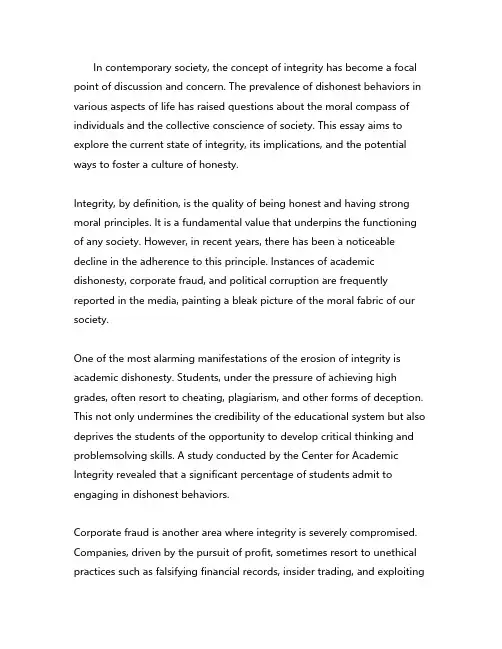
In contemporary society, the concept of integrity has become a focal point of discussion and concern. The prevalence of dishonest behaviors in various aspects of life has raised questions about the moral compass of individuals and the collective conscience of society. This essay aims to explore the current state of integrity, its implications, and the potential ways to foster a culture of honesty.Integrity, by definition, is the quality of being honest and having strong moral principles. It is a fundamental value that underpins the functioning of any society. However, in recent years, there has been a noticeable decline in the adherence to this principle. Instances of academic dishonesty, corporate fraud, and political corruption are frequently reported in the media, painting a bleak picture of the moral fabric of our society.One of the most alarming manifestations of the erosion of integrity is academic dishonesty. Students, under the pressure of achieving high grades, often resort to cheating, plagiarism, and other forms of deception. This not only undermines the credibility of the educational system but also deprives the students of the opportunity to develop critical thinking and problemsolving skills. A study conducted by the Center for Academic Integrity revealed that a significant percentage of students admit to engaging in dishonest behaviors.Corporate fraud is another area where integrity is severely compromised. Companies, driven by the pursuit of profit, sometimes resort to unethical practices such as falsifying financial records, insider trading, and exploitingworkers. The 2008 financial crisis, for instance, was largely attributed to the unethical practices of financial institutions, which led to a global economic downturn.Political corruption is yet another area where integrity is frequently breached. Politicians, in their quest for power and wealth, often engage in bribery, embezzlement, and other forms of corruption. This not only erodes public trust in the political system but also hinders the delivery of essential services to the citizens. The Transparency Internationals Corruption Perceptions Index consistently ranks countries based on the perceived level of corruption, highlighting the extent of this problem.The implications of the decline in integrity are farreaching. It undermines trust, fosters cynicism, and erodes the social fabric. It also leads to inefficiencies, as resources are diverted to monitoring and preventing dishonest behaviors. Moreover, it creates a culture where dishonesty is normalized, leading to a moral decay of society.To address this issue, it is essential to foster a culture of integrity. This can be achieved through education, where values such as honesty, fairness, and responsibility are instilled from a young age. Schools can incorporate character education programs that emphasize the importance of integrity and provide students with the skills to make ethical decisions.In addition, the legal system should be strengthened to deter dishonest behaviors. Strict penalties for those found guilty of fraud, corruption, and other unethical practices can serve as a deterrent. Moreover, transparencyand accountability should be promoted in both the public and private sectors to minimize the opportunities for corruption.Furthermore, the media plays a crucial role in shaping public opinion and promoting integrity. By highlighting the consequences of dishonest behaviors and showcasing examples of individuals who have demonstrated integrity, the media can inspire others to uphold ethical standards.In conclusion, the current state of integrity is a cause for concern. However, by fostering a culture of honesty through education, strengthening the legal system, promoting transparency, and leveraging the power of the media, we can work towards a society where integrity is valued and upheld. It is a collective responsibility to ensure that our actions are guided by strong moral principles, and that we contribute to the creation of a more ethical and trustworthy society.。
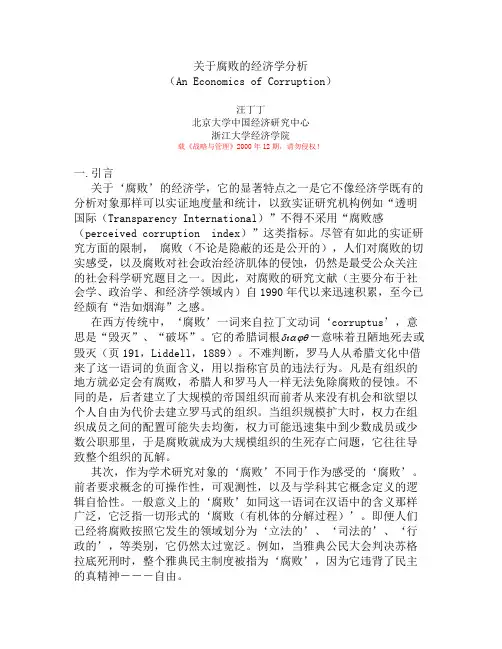
关于腐败的经济学分析(An Economics of Corruption)汪丁丁北京大学中国经济研究中心浙江大学经济学院载《战略与管理》2000年12期,请勿侵权!一.引言关于‘腐败’的经济学,它的显著特点之一是它不像经济学既有的分析对象那样可以实证地度量和统计,以致实证研究机构例如“透明国际(Transparency International)”不得不采用“腐败感(perceived corruption index)”这类指标。
尽管有如此的实证研究方面的限制,腐败(不论是隐蔽的还是公开的),人们对腐败的切实感受,以及腐败对社会政治经济肌体的侵蚀,仍然是最受公众关注的社会科学研究题目之一。
因此,对腐败的研究文献(主要分布于社会学、政治学、和经济学领域内)自1990年代以来迅速积累,至今已经颇有“浩如烟海”之感。
在西方传统中,‘腐败’一词来自拉丁文动词‘corruptus’,意思是“毁灭”、“破坏”。
它的希腊词根 -意味着丑陋地死去或毁灭(页191,Liddell,1889)。
不难判断,罗马人从希腊文化中借来了这一语词的负面含义,用以指称官员的违法行为。
凡是有组织的地方就必定会有腐败,希腊人和罗马人一样无法免除腐败的侵蚀。
不同的是,后者建立了大规模的帝国组织而前者从来没有机会和欲望以个人自由为代价去建立罗马式的组织。
当组织规模扩大时,权力在组织成员之间的配置可能失去均衡,权力可能迅速集中到少数成员或少数公职那里,于是腐败就成为大规模组织的生死存亡问题,它往往导致整个组织的瓦解。
其次,作为学术研究对象的‘腐败’不同于作为感受的‘腐败’。
前者要求概念的可操作性,可观测性,以及与学科其它概念定义的逻辑自恰性。
一般意义上的‘腐败’如同这一语词在汉语中的含义那样广泛,它泛指一切形式的‘腐败(有机体的分解过程)’。
即便人们已经将腐败按照它发生的领域划分为‘立法的’、‘司法的’、‘行政的’,等类别,它仍然太过宽泛。
透明国际透明国际(英语:Transparency International)即“国际透明组织”,简称TI,成立于1993年,总部立于德国柏林,是一个旨在反对贪污腐败的国际非政府组织。
从1995年起,制定和公布清廉指数。
该组织在与一些政府合作反对腐败,经过多年发展,透明国际已成为对腐败问题研究最权威、最全面和最准确的国际性非政府组织,该组织已在100多个国家成立了分会。
“透明国际”于1993年5月成立。
这是一个由政府官员、有关专家和商人组成的志愿组织,由德国政府提供基金,并且每年向发起国、一些国家政府、援助机构和公司征集大约100万美元作为活动经费。
创建者是德国人彼得·艾根。
总部设在柏林。
该组织的宗旨是致力于揭露世界各地以权谋私行为。
该组织的全球目标包括:确定明确的财产权,审查法律标准和商业惯例,以加强责任心,促进和支持反行贿受贿信息交流中心的地方分部的工作。
它已在美国、英国、德国和厄瓜多尔等100多个国家设立了分部。
“透明国际”已成为对腐败问题研究得最权威、最全面和最准确的国际性非政府组织,它的研究结果经常被其他权威国际机构反复引用。
透明国际 - 主要工作透明国际的主要工作是:1.主持或参与国际性或地区性反腐败会议;推动该组织各国支部成立;2.出版大量有关反腐败的出版物;定期出版《透明国际通讯》等刊物;3.建立自己的网站,发布有关反腐败的信息;4.每年发布一期“全球腐败指数”等等,其中“全球腐败指数”已经在全世界产生了较大影响。
透明国际立场中立,不依附于任何政治党派,所作的全球反腐败报告每年发布一次,目的是提高全球各界对腐败危害性的认识,督促各国积极采取相应对策。
衡量世界各国和地区的腐败状况,“透明国际”是以CPI(清廉指数)和BPI(行贿指数)构成的腐败指数来进行评估的。
CPI反映的是全球各国商人、学者及风险分析人员对世界各国腐败状况的观察和感受。
它的数据来源是由一些专家学者从国际上重要、著名的调查报告(如号称世界“权威”的“盖洛普”、“政治与经济风险组织”、“世界经济论坛”等机构和组织所作的调查报告)提取有关人士对各个国家腐败程度的感觉和评判数据,加以综合评估,给出分数。
Transparency International and Evalution of
Corruption in China
作者: 韩江舟 [1];葛世伦 [2]
作者机构: 国家发展和改革委员会,中国,北京,100824[1] 江苏科技大学,经济管理学院,江苏,镇江,212003[2]
出版物刊名: 华东船舶工业学院学报:社会科学版
页码: 25-29页
主题词: 透明国际;国民廉政体系CPI;BPI;中国反腐败
摘要:透明国际是全球唯一的反腐败国际性组织,致力于在世界各国政府、企业界推进反腐败运动.透明国际采用CPI和BPI指数体系评估一国的腐败状况,以期引起该国对腐败问题的重视并采取措施.根据透明国际近些年对我国腐败状况的评估,结合我国改革开放以来反腐败的实践,经过分析可以看出我国反腐败斗争的特点,并对反腐败的发展趋势做出预测.这有助于在全球反腐败背景下探讨我国反腐败斗争的规律.。
在上世纪八十年代,德国著名社会学家乌尔里希·贝克(Ulrich Beck)首次在《风险社会》一书中提出了“风险社会”的概念,描绘了疫病暴发、环境污染、核危机、网络安全以及金融危机的图景。
在全球化的大背景下,人类社会面临着比以往任何时候都更多的风险。
企业走出去主要关注政治风险和经济风险,廉洁风险作为政治风险和经济风险的混合,既提供了境外风险防控的切入点,也是诸多风险防范活动的缩影。
本文拟将我国企业“走出去”面临的风险挑战,放置在国际化的风险社会之下进行分析,提出潜在廉洁风险防控的路径。
一、从风险到全球风险社会(一)风险的概念风险与人类的日常生活息息相关,无时无刻不在。
汉语中的“风险”与英语单词“Risk”相对应,“Risk”一词源于16至17世纪的西方航海家。
《风险管理原则与实施指南》(ISO31000-2009)指出:“风险是不确定性对目标的影响。
”可见,风险要素包括两个方面:一是“风险”与“不确定性”紧密相关,但两者存在一定的差异性;二是风险与人类的价值判断密切相关,即人类改造自然和社会活动的目标受“风险”影响。
(二)全球风险社会的提出风险社会是现代化的结果,其衍生的后果具有全球性。
首先,风险造成的灾难不再局限在发生地,而经常产生无法弥补的全球性破坏。
因此风险计算中的经济赔偿无法实现;其次,风险的严重程度超出了预警检测和事后处理的能力;再次,由于风险发生的时空界限发生了变化,甚至无法确定,所以风险计算无法操作。
正如切尔诺贝利、福岛核电站事件,最后灾难性事件产生的结果多样,使得风险计算程序、常规标准等难以把握。
贝克提出的“全球风险社会”概念,大大增加了风险的来源,放大了风险的影响和潜在后果。
针对全球风险社会的高复杂性和高危害性,贝克提出了“双向合作风险治理模式”,即风险治理的主体不能再像过去那样仅由个别的民族政府来承担。
在全球风险社会中,风险治理的主体包括政府、企业、社区和非盈利组织,并在他们之间构筑起共同治理风险的网络联系和信任关系,建立起资源、信息交流与互补的民族内部平台,在各民族之间突破国界建立起风险治理的国际网络和国际间的信任平台,共同应对全球风险社会的挑战。
文/李梓新在渣华道将尽的拐角处,有一座25层的蓝色玻璃幕墙大厦,这就是在华人世界中耳熟能详的香港廉政公署。
这个由英国人创立的机构,自1996年起由华人接管运作,如今使得香港的廉洁程度超过英国。
在“透明国际”(TransparencyInternational)的国际清廉指数2011年排名中,香港高居全球183个国家和地区中的第12位。
香港的廉洁并非天然形成,上世纪70年代,香港贪腐横行,警察队伍更是贪污行为的带头人和庇护者。
1974年,拥有独立权力的廉政公署成立,在其后的38个年头中,廉政公署一扫香港贪腐风气,成为廉洁的守护神。
这个1300人的独立组织究竟如何运作?传说中在联署“喝咖啡”又是什么味道?2012年8月中旬,香港北角渣华道。
这闷热而充满生活气息的街道,与摩天楼宇里的冷气世界形成鲜明对比。
它位于香港岛北端正中靠海位置,有渡轮可直通红。
渣华其实是爪哇(Java)的港译,得名于早年在此设立办事处的渣华轮船公司,这个公司的客轮运送爪哇岛等地的华侨回香港进行贸易与探亲。
华人首富李嘉诚1958年在附近购入第一块地皮,兴建12层厂房,开始了他在香港地产界呼风唤雨的历史。
现在,这片早年闽南人聚居的“小福建”已经成了香港人均收入最高的地区之一,却仍保留了浓郁的生活气息。
一边是不息的海风,一边是奇华饼家、大家乐、鱼蛋粉、丰泽电器和莎莎化妆品店。
既有闲坐吃早茶的客人,也有电车和大小巴士从狭窄的街道呼啸而过。
香港的动与静全体现在这一角。
高级新闻主任谭家辉每天早上要在7点起床,从红搭渡轮,8点前来到渣华道303号的廉政香港廉政公署廉洁的奥秘上左:廉政公署前执行处处长郭文纬上右:廉政公署首席防贪主任利逸修下:廉政公署廉政教育主任严厚蕴04传奇·传记上旬2013.03文学选刊公署———比他的领导还早一个小时。
在这一个小时里,他要收集当天香港报章的主要新闻,特别是涉及廉政公署的报道,做成剪报,在领导上班之前放在她的桌上。
沃尔夫斯堡的反贪污腐败声明沃尔夫斯堡组织1联同透明国际(Transparency International)及巴塞尔公司治理研究院(Basel Institute on Governance)作出以下声明,更清楚阐述沃尔夫斯堡组织和金融机构在支持国际合作打击贪污腐败事宜上所担任的角色,并提出金融机构可考虑的一些措施,避免在本身的运作中出现贪污腐败,以及保护本身的业务运作免被用作进行贪污腐败活动。
鉴于种种发展,包括《联合国反腐败公约》于2005年12月9日生效,而该公约是附加于现时有关打击贪污腐败的跨国性和国家法律的重要条约2,沃尔夫斯堡组织决定在此时作出反贪污腐败声明。
《联合国反腐败公约》的序言明确阐述贪污腐败破坏法治、民主体制与人类的基本自由、威胁国家的稳定与发展,以及损害自由贸易与公平竞争。
此外,贪污腐败也会降低投资和融资水平及其效用,尤其是在经济环境较差的社会。
1. 序言虽然没有单一定义可以详尽说明什么是贪污腐败,但贪污腐败行为通常涉及滥用公职或利用公职权力来谋取私利,通过提供或许诺给予任何贵重物品(不论直接或间接)给任何公职人员或政治候选人、政党或政党人员,以获得、保留或得以经营业务或者在经营过程中取得任何其他不正当利益。
相反,贪污腐败亦可能是要求任何人士给予或接受任何人士的贵重物品,作为(不论直接或间接)给予业务交易或其他不正当利益的条件。
贪污腐败通常与有组织犯罪、清洗黑錢活动相连,有时甚至与资助恐怖活动有关。
打击贪污腐败必须以全面、多方合作的方式由各国和本国政府部门和执法机关领导进行,并需要民间团体和工商界协助。
沃尔夫斯堡组织各成员全力参与打击贪污腐败,反对一切贪污腐败行为,并承诺遵守各项打击贪污腐败的法律。
沃尔夫斯堡组织各成员之间将会合力打击贪污腐败,力求配合对有关金融机构具有司法管辖权的政府,以及该金融机构认为适当的其他公共和私营机构、组织和民间团体所进行的打击贪污腐败工作。
沃尔夫斯堡组织各成员均了解到,可能会有人利用其机构支付贿款或清洗黑錢,故认为有需要采取切实可行的措施以免机构被滥用。
透明国际2005-2010年清廉指数数据与来源-Transparency International Corruption Perceptions Index 2005, page 7 of 8 -排行国家或地区2005 清廉指数得分* 误差范围**采用指数***1 冰岛9.7 9.5 - 9.7 82 芬兰9.6 9.5 - 9.7 9新西兰9.6 9.5 - 9.7 94 丹麦9.5 9.3 - 9.6 105 新加坡9.4 9.3 - 9.5 126 瑞典9.2 9.0 - 9.3 107 瑞士9.1 8.9 - 9.2 98 挪威8.9 8.5 - 9.1 99 澳大利亚8.8 8.4 - 9.1 1310 奥地利8.7 8.4 - 9.0 911 荷兰8.6 8.3 - 8.9 9联合王国8.6 8.3 - 8.8 1113 卢森堡8.5 8.1 - 8.9 814 加拿大8.4 7.9 - 8.8 1115 香港8.3 7.7 - 8.7 1216 德国8.2 7.9 - 8.5 1017 美国7.6 7.0 - 8.0 1218 法国7.5 7.0 - 7.8 1119 比利时7.4 6.9 - 7.9 9爱尔兰7.4 6.9 - 7.9 1021 智利7.3 6.8 - 7.7 10日本7.3 6.7 - 7.8 1423 西班牙7.0 6.6 - 7.4 1024 巴巴多斯6.9 5.7 - 7.3 325 马耳他6.6 5.4 - 7.7 526 葡萄牙6.5 5.9 - 7.1 927 爱沙尼亚6.4 6.0 - 7.0 1128 以色列6.3 5.7 - 6.9 10安曼6.3 5.2 - 7.3 530 阿拉伯联合酋长国6.2 5.3 - 7.1 631 斯洛文尼亚6.1 5.7 - 6.8 11博茨瓦纳5.9 5.1 - 6.7 8卡塔尔5.9 5.6 - 6.4 5台湾5.9 5.4 - 6.3 1432乌拉圭5.9 5.6 - 6.4 636 巴林5.8 5.3 - 6.3 6约旦5.7 5.1 - 6.1 1039 马来西亚5.1 4.6 - 5.6 14 匈牙利5.0 4.7 - 5.2 11意大利5.0 4.6 - 5.4 940南韩5.0 4.6 - 5.3 1243 突尼斯4.9 4.4 - 5.6 744 立陶宛4.8 4.5 - 5.1 845 科威特4.7 4.0 - 5.2 646 南非4.5 4.2 - 4.8 11捷克共和国4.3 3.7 - 5.1 10希腊4.3 3.9 - 4.7 9纳米比亚4.3 3.8 - 4.9 847斯洛伐克4.3 3.8 - 4.8 10哥斯达黎加4.2 3.7 - 4.7 7萨尔瓦多4.2 3.5 - 4.8 6拉脱维亚4.2 3.8 - 4.6 751毛里求斯4.2 3.4 - 5.0 6保加利亚4.0 3.4 - 4.6 8哥伦比亚4.0 3.6 - 4.4 9斐济4.0 3.4 - 4.6 355塞舌尔群岛4.0 3.5 - 4.2 3古巴3.8 2.3 - 4.7 4泰国3.8 3.5 - 4.1 1359特立尼达多巴哥3.8 3.3 - 4.5 6 62 伯利兹3.7 3.4 - 4.1 3巴西3.7 3.5 - 3.9 1064 牙买加3.6 3.4 - 3.8 6加纳3.5 3.2 - 4.0 8墨西哥3.5 3.3 - 3.7 10巴拿马3.5 3.1 - 4.1 7秘鲁3.5 3.1 - 3.8 765土耳其3.5 3.1 - 4.0 11布基纳法索3.4 2.7 - 3.9 3克罗地亚3.4 3.2 - 3.7 770埃及3.4 3.0 - 3.9 9莱索托3.4 2.6 - 3.9 3波兰3.4 3.0 - 3.9 11叙利亚3.4 2.8 - 4.2 577 老挝3.3 2.1 - 4.4 3中国3.2 2.9 - 3.5 14摩洛哥3.2 2.8 - 3.6 878塞内加尔3.2 2.8 - 3.6 6莱索托3.4 2.6 - 3.9 3波兰3.4 3.0 - 3.9 11沙特阿拉伯3.4 2.7 - 4.1 5叙利亚3.4 2.8 - 4.2 577 老挝3.3 2.1 - 4.4 3中国3.2 2.9 - 3.5 14摩洛哥3.2 2.8 - 3.6 878塞内加尔3.2 2.8 - 3.6 6 CountryRank Country/territory2005 CPIScoreConfidencerangeSurveysUsed斯78 里兰卡3.2 2.7 - 3.6 7苏里南3.2 2.2 - 3.6 383 黎巴嫩3.1 2.7 - 3.3 4卢旺达3.1 2.1 - 4.1 3多米尼加共和国3.0 2.5 - 3.6 6 蒙古3.0 2.4 - 3.6 485罗马尼亚3.0 2.6 - 3.5 11阿美尼亚2.9 2.5 - 3.2 4贝宁2.9 2.1 - 4.0 5波黑共和国2.9 2.7 - 3.1 6加蓬2.9 2.1 - 3.6 4印度2.9 2.7 - 3.1 14伊朗2.9 2.3 - 3.3 5马里2.9 2.3 - 3.6 8摩尔多瓦2.9 2.3 - 3.7 588坦桑尼亚2.9 2.6 - 3.1 8阿尔及利亚2.8 2.5 - 3.3 7阿根廷2.8 2.5 - 3.1 10马达加斯加2.8 1.9 - 3.7 5马拉维2.8 2.3 - 3.4 797塞尔维亚和蒙特尼格罗2.8 2.5 - 3.3 7冈比亚2.7 2.3 - 3.1 7马其顿2.7 2.4 - 3.2 7史瓦济兰2.7 2.0 - 3.1 3103也门2.7 2.4 - 3.2 5白俄罗斯2.6 1.9 - 3.8 5吉布提2.6 1.7 - 3.5 3洪都拉斯2.6 2.2 - 3.0 7哈萨克斯坦2.6 2.2 - 3.2 6尼加拉瓜2.6 2.4 - 2.8 7巴勒斯坦2.6 2.1 - 2.8 3乌克兰2.6 2.4 - 2.8 8越南2.6 2.3 - 2.9 10赞比亚2.6 2.3 - 2.9 7107津巴布韦2.6 2.1 - 3.0 7阿富汗2.5 1.6 - 3.2 3玻利瓦尔2.5 2.3 - 2.9 6厄瓜多尔2.5 2.2 - 2.9 6危地马拉2.5 2.1 - 2.8 7圭亚那2.5 2.0 - 2.7 3利比亚2.5 2.0 - 3.0 4尼泊尔2.5 1.9 - 3.0 4菲律宾2.5 2.3 - 2.8 13117乌冈达2.5 2.2 - 2.8 8阿尔巴尼亚2.4 2.1 - 2.7 3尼日2.4 2.2 - 2.6 4俄罗斯2.4 2.3 - 2.6 12126塞拉利昂2.4 2.1 - 2.7 3布隆迪2.3 2.1 - 2.5 3柬埔寨2.3 1.9 - 2.5 4刚果共和国2.3 2.1 - 2.6 4格鲁吉亚2.3 2.0 - 2.6 6吉尔吉斯斯坦2.3 2.1 - 2.5 5 巴布亚新几内亚2.3 1.9 - 2.6 4 130委内瑞拉2.3 2.2 - 2.4 10阿塞拜疆2.2 1.9 - 2.5 6喀麦隆2.2 2.0 - 2.5 6印度尼西亚2.2 2.1 - 2.5 13伊拉克2.2 1.5 - 2.9 4利比里亚2.2 2.1 - 2.3 3137乌兹别克斯坦2.2 2.1 - 2.4 5刚果民主共和国2.1 1.8 - 2.3 4肯尼亚2.1 1.8 - 2.4 8巴基斯坦2.1 1.7 - 2.6 7144巴拉圭2.1 1.9 - 2.3 7索马里2.1 1.6 - 2.2 3苏丹2.1 1.9 - 2.2 5塔吉克斯坦2.1 1.9 - 2.4 5151 安哥拉2.0 1.8 - 2.1 5象牙海岸1.9 1.7 - 2.1 4赤道几内亚1.9 1.6 - 2.1 3152尼日利亚1.9 1.7 - 2.0 9海地1.8 1.5 - 2.1 4缅甸1.8 1.7 - 2.0 4155土库曼斯坦1.8 1.7 - 2.0 4孟158 加拉国1.7 1.4 - 2.0 7乍得1.7 1.3 - 2.1 6. -Transparency International Corruption Perceptions Index 2005, page 7 of 8 -透明国际2005年清廉指数数据来源Number 1 2 3 4缩写CU EIU FH II来源哥伦比亚大学国际地球科学信息网络伦敦经济学人智库美国自由之家黎巴嫩信息国际名称综合国力国家风险分析及预测转型国家中东地区商人年份2003 2005 2005 2003网址/ /research/nattransit.htmrmationinternational com调查对象美国专家对驻所国评估(政策分析家、学者及记者)专家评估美国专家对驻所国评估Senior businesspeople fromBahrain, Lebanon and UAE询问问题一国腐败程度滥用公权谋取私利或政党利益公众、媒体对政府官员腐败程度及其实施反腐败策略的评价行贿现象有多普遍?由于腐败对经商造成的额外负担有多沉重?公共合同被发包给亲朋好友的现象有多普遍?问卷回收224 Not applicable Not applicable382 assessments from 165 respondents涵盖国家95 个国家或地区156 个国家或地区29 个国家或地区31 个国家或地区Number 5 6 7 8缩写IMD MIG来源瑞士洛桑国际发展管理学院国际商业集团名称国际竞争力年鉴Grey Area Dynamics年份2003 2004 2005 2005网址www.imd.ch 调查对象一国及跨国公司中中层及高层管理人员专家及地区记者询问问题经济领域中的贿赂及腐败现象腐败现象,从贿赂政府部长到向最敦厚的职员提供诱惑问卷回收> 4,000 4166 约4000 Not applicable涵盖国家51 个国家155 个国家Number 9 10 11 12缩写PERC UNECA来源香港政治及经济风险咨询公司联合国非洲经济公署名称Asian Intelligence Newsletter 非洲政府报告年份2003 2004 2005 2005“打击腐败网址/ /agr/调查对象外派公司管理人员每一国家里选出70-120 名专家询问问题跟您自己的国家相比,您认为驻所国腐败问题有多严重?”. 这包括立法、司法和行政层级,也包括税收。